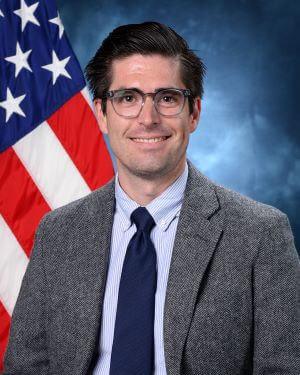
Contact Information
Bio
Daniel Couch is Associate Professor of English at the U.S. Air Force Academy, Colorado. From 2016-2017 he was a postdoctoral visiting scholar at the American Academy of Arts & Sciences, and from 2015-2016 he was a dissertation fellow at the McNeil Center for Early American Studies at the University of Pennsylvania.
His first book, American Fragments: The Political Aesthetic of Unfinished Forms in the Early Republic, was released with University of Pennsylvania Press in 2022. American Fragments has been reviewed in the Journal of the Early American Republic, Eighteenth-Century Studies, Australasian Journal of American Studies, Eighteenth-Century Fiction, Early American Literature, and American Literary History. He has also co-edited a collection (with Matthew Pethers) titled The Part and the Whole in Early American Literature, Print Culture, and Art (Bucknell University Press, 2024). Dr. Couch has also started drafting a second project examining the affect, politics, and literature in the early nation.
Education
Ph.D., UCLA (2016)
Bachelor of Arts, UCLA (2007)
Professional Experience
Prof. Couch has taught American literature in the English departments at UCLA and the U.S. Air Force Academy. His teaching focuses on early and nineteenth-century American literature.
Honors & Awards
Filson Fellowship, The Filson Historical Society (2024)
2021 Hennig Cohen Prize for the best article, book chapter, or essay in a book about Herman Melville (awarded in 2023)
Reese Fellowship in the Print Cultures of the Americas, William L. Clements Library (2022)
William T. Buice III Scholarship, University of Virginia Rare Book School (2021)
McDermott Award for Research Excellence in the Humanities, US Air Force Academy (2020-2021)
Dean of Faculty Humanities Research Grant, US Air Force Academy (2018 & 2021)
Reese Fellowship, American Antiquarian Society (2020)
Robert L. Middlekauff Fellowship, The Huntington Library (2019)
Lillian Gary Taylor Visiting Fellowship in American Literature, University of Virginia (2018)
Barra Foundation/Edward C. Carter II Fellowship, American Philosophical Society (2016)
Mellon Advisory Committee in Pedagogy Fellowship, UCLA English (2015-2016, declined)
Andrew W. Mellon Dissertation Fellowship in Early American Literature and Material Texts, McNeil Center for Early American Studies & Library Company of Philadelphia (2015-2016)
George Chavez Endowed Graduate Dissertation Fellowship, UCLA English (2014-2015)
Mellon Foundation Pre-Dissertation Fellowship, UCLA Graduate Division (2014)
Mellon Advisory Committee in Pedagogy Fellowship, UCLA English (2013-2014)
English Department Conference Travel Grant, UCLA English (2011, 2013-2016)
Graduate Summer Research Mentorship, UCLA Graduate Division (2010 & 2011)
Eugene V. Cota Robles Fellowship, UCLA Graduate Division (2009-2013)
Research and Scholarly Interests
Eighteenth- and nineteenth-century America, affect studies, the history of aesthetics, theories of form and formalism, political philosophy in the early republic, the history of the book
Publications
Essays
“Fragments, Scraps, and the Formalism of the Historical Imagination,” in The Part and the Whole in Early American Literature, Print Culture, and Art, eds. Matthew Pethers and Daniel Diez Couch (Bucknell: Bucknell University Press, 2024): 95-115.
“Setting Fires with Hawthorne: 'Earth's Holocaust' and Book Burning in Nineteenth-Century America,” Nineteenth-Century Literature 78.2 (2023): 87-113.
“Silent Eloquence: Literary Extracts, the Aesthetics of Disability, and Melville’s ‘Fragments’” with Michael Anthony Nicholson, Leviathan: A Journal of Melville Studies 23.1 (2021): 7-23. *Winner of the 2021 Hennig Cohen Prize for the best article, book chapter, or essay in a book about Herman Melville*
“Poe, Sympathetic Ink, and Chemical Landscapes in Nineteenth-Century America,” Arizona Quarterly: A Journal of American Literature, Culture, and Theory 75.3 (Fall 2019): 1-26.
“Printing Emma Corbett: Revolutionary Violence and the Prosthetics of Typography,” The Eighteenth Century: Theory and Interpretation 59.4 (Winter 2018): 449-469.
“Erasure,” Early American Studies, Special issue on “Keywords for Early American Literature and Material Texts” 16.4 (Fall 2018): 665-671.
“A Syntax of Silence: The Punctuated Spaces in ‘Bartleby the Scrivener. A Story of Wall-Street,’” Studies in American Fiction 42.2 (Fall 2015): 167-190.
“Eliza Wharton’s Scraps of Writing: Dissipation and Fragmentation in The Coquette,” Early American Literature 49.3 (Fall 2014): 683-705.
Reviews
The Folly of Revolution: Thomas Bradbury Chandler and the Loyalist Mind in a Democratic Age by S. Scott Rohrer, Early American Literature 59.2 (2024): 481-485.
The New Melville Studies, ed. Cody Marrs, Nineteenth-Century Literature 78.4 (2024): 324-327.
Burning the Books: A History of the Deliberate Destruction of Knowledge by Richard Ovenden, American Literary History Online Review, Series XXX.
Collected Writings of Charles Brockden Brown, vol. 4: Political Pamphlets edited by Mark L. Kamrath, Stephen Shapiro, and Maureen Tuthill, Early American Literature 56.1 (2021): 307-309.
Herman Melville: Among the Magazines by Graham Thompson, Nineteenth-Century Literature 73.3 (Winter 2018): 418-422.
The American School of Empire by Edward Larkin, Early American Literature 53.3 (Fall 2018): 981-985.
“The Year In Conferences—2012,” Co-author. ESQ: A Journal of the American Renaissance 59.1 (2013): 113-230.